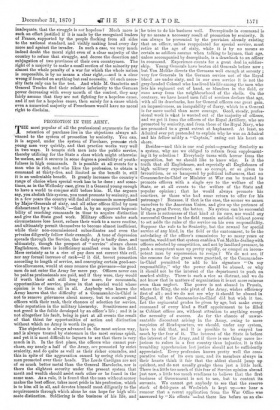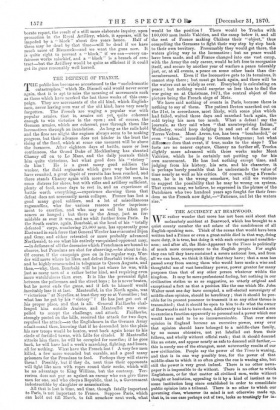PROMOTION IN THE ARMY.
THE most popular of all the professional arguments for the retention of purchase lies in the objections always ad- 'yawed to the system of promotion by seniority. You can, it is argued, under the system of Purchase, promoie rich young men very quickly, and that practice works very well in two ways. It tempts rich men into the public service, thereby utilizing for the State a class which might otherwise be useless, and it secures in some degree a possibility of youth- fulness in high commands. It is possible at all events for a man who is rich, and who likes the profession, to obtain a command at thirty-five, and limited as the benefit is, still it is an undeniable benefit. It greatly increases the country's range of choice when special work has to be done ; and some- times, as in the Wellesley case, gives it a General young enough to have a world to conquer still before him. If, the arguers say, you abolish this system, you must promote by seniority, and in a few years the country will find all commands monopolized by Major-Generals of sixty, and all other offices filled by men disheartened by a "block,"—that is, by an apparent impossi- bility of reaching commands in time to acquire distinction and give the State good work. Military officers under such circumstances lose heart, reduce their work to a mere routine, and ultimately permit themselves to become almost inefficient, while their non-commissioned subordinates and even the privates diligently follow their example. A tone of depression spreads through the Service, the daily duty is badly done, and ultimately, though the prospect of "service" always cheers Englishmen, there is inefficiency manifest even in the field. Mere certainty as to a rise of pay does not correct this evil, nor any formal increase of rank—if it did, brevet promotion according to length of service, and conveying certain good-ser- vice allowances, would at once remove the grievance—for good men do not enter the Army for mere pay. Officers never can be paid as professionals are paid, and if they were, they would if worth their salt still long for more, for commands, opportunities of service, places in that special world whose opinion is to them all in all. Anybody who knows the Army knows that the difficulty of a Commander-in-Chief is not to remove grievances about money, but to content good officers with their rank, their chances of selection for service, their reputation in the military hierarchy. Sensitiveness and not greed is the foible developed by an officer's life ; and it is not altogether his fault, being in part at all events the result of that thirst for opportunities of action and distinction without which no Army is worth its pay.
The objection is always advanced in the most serious way, and is always treated by statesmen in the most serious spirit, and yet it is most difficult to laymen to see that there is very much in it. In the first place, the officers who cannot pur- chase, say nearly a half of the Army, are promoted by strict seniority, and do quite as well as their richer comrades, and this in spite of the aggravation caused by seeing rich young men promoted over their heads. The Lords Cardigan are not of so much better metal than the General Havelocks, nor is there the slightest security under the present system that merit and wealth should assist each other or be found in the same man. As a rule, it is found that the man without money makes the best officer, takes most pride in his profession, which is to him all in all, and devotes himself most diligently to the acquirements through which alone he can hope for high ulti- mate distinction. Soldiering is the business of his life, and he tries to do his business well. Decrepitude in command is by no means a necessary result of promotion by seniority. It can always be prevented by the provision already existing that an officer, unless reappointed for special service, must retire at the age of sixty, while it is by no means so certain as soldiers assume when talking to laymen, that age, unless accompanied by decrepitude, is a drawback to an officer in command. Experience counts for a great deal in soldier- ship. Young Generals have beaten old Generals before now ; but Von Moltke directs the Germans well enough at seventy • very few Generals in the German service not of the Royal blood are under sixty, and in our own service it is not the grey-headed Colonel who has lived his life among the men who lets his regiment out of hand, or blunders in the field, or runs away from the neighbourhood of the shells. On the contrary, we have heard men full of services declare that age, with all its drawbacks, has for General officers one great gain, an impassiveness, an incapability of flurry, which in a General is far more useful than mere courage. Good, steady, profes- sional work is what is wanted out of the majority of officers, and we get it from the officers of the Royal Artillery, who are promoted by seniority, and from those of the Royal Navy, who are promoted to a great extent at haphazard. At least, no Admiral ever yet pretended to explain why he was an Admiral and his fellow middy a "Captain," eating out his heart on shore.
Besides—and this is our real point—granting Seniority as a system, why are we obliged to refrain from supplement- ing it by selection ? Everybody turns with horror from the supposition, but we should like to know why. Is it the truth that all Englishmen, and especially all Englishmen of high military experience, are so corrupt, or so given to favouritism, or so hampered by political influences, that no Commander-in-Chief or Minister at War can be trusted to promote officers with a single eye to the welfare of the or at all events to the welfare of the State and popular opinion ; that he would always promote his courtiers, or those who had some return to offer for his patronage ? Because, if that is the case, the sooner we annex ourselves to the American Union, and give up the pretence of being a great Power, the better. No system can be successful if there is rottenness of that kind at its core, nor would any successful General in the field remain satisfied without power to set aside the rules of the service on his own responsibility. Suppose the rule to be Seniority, but the reward for special service of any kind, in the field or the cantonment, to be the antedating of the officer's commission by so many years or months, would not that system enable a Von Moltke dealing with officers selected by competition, and not by landlord pressure, to push a competent man up pretty rapidly, or compel an incom- petent man by supersession to resign ? We do not see, if the reasons for the grant were gazetted, or the Commander- in-Chief permitted to add to his signature "On my responsibility," why the power should be abused, or why it should not be the interest of the department to push on marked ability. There is such a vice as distrust, and we do not know that in matters of organization it is not more ruinous even than neglect. The power is not abused in Prussia, where the King, the sole pivot of the Army, wishes efficiency first of all ; and we do not see why it should be abused in England, if the Commander-in-Chief did but wish it too. Let the regimental grades be given by age, but make every command of every kind a Staff appointment to be filled as Cabinet offices are, without attention to anything except the necessity of success. As for the chance of unwar- rantable discontent arising in the Army, owing to mere suspicion of Head-quarters, we should, under any system, have to risk that, and it is possible to be swayed too much by the fear of it. The interest of the State is before the interest of the Army, and if there is one thing more in- jurious to rulers in a free country than injustice, it is this trembling apprehension lest justice should not be sufficiently appreciated. Every profession knows pretty well the com- parative value of its own men, and its members always in their hearts think it fair that the ablest should jump up, quickest, and do not usually grudge them just a little luck. There is a little too much of this fear of Service opinion abroad just now, a little too much readiness to believe that the first business of Government is not to use, , but to content its servants. We cannot get anybody to see that the reserve stock of field-guns at Woolwich is kept up—we hear a rumour that a recent application from the War Office was answered by "No effects "—but there lies before us an ela-
borate report, the result of a still more elaborate inquiry, upon promotion in the Royal Artillery, which, it appears, will be impeded by a n block" about five years hence. Half of them may be dead by that time—will be dead if we have much more of Bismarck—and we want the guns now. It is quite right to prevent a "block," if we can—every un- fairness works mischief, and a " block " is a breach of con- tract—but the Artillery would be quite as efficient if it could get its guns reasonably well horsed.



































 Previous page
Previous page